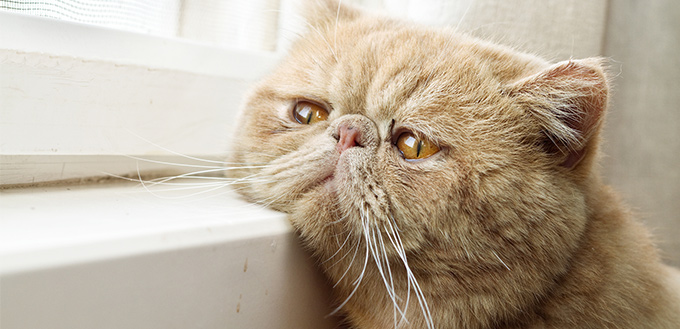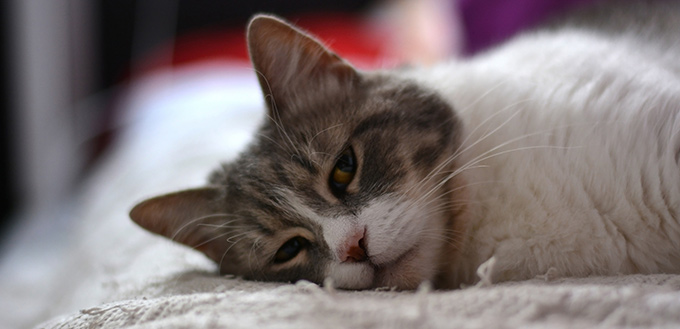If you think only human beings experience sadness and struggle with depression, think again. Cats, being the highly perceptive animals that they are, are easily affected by their environment, people around them, and changes in their routines. As a result, some really do suffer from depression. Other times, cats are simply sick and may appear depressed because they’re in pain. If you’re wondering why the sudden change in your feline companion’s behavior, we hope this article will be able to help you determine the cause so you can seek the right treatment.

Depression in Cats
In humans, depression is characterized by an overwhelming feeling of sadness or despair that affects how a person thinks, feels, and behaves. Symptoms vary but are usually a combination of ‘abnormal’ (out of the person’s normal or typical) behaviors, such as insomnia or sleeping too much, fatigue, trouble concentrating, loss of interest, under-eating or over-eating, etc. In cats, the symptoms can be quite similar, and include:
- Loss of appetite
- Weight loss
- Hiding from family members
- Increased sleeping
- Lack of grooming
- Aggression/hissing
- Inappropriate litter box behavior.
Although these symptoms may seem similar to symptoms of depression in humans, it’s important not to apply human definitions of depression to cats, as clearly, we’re very different beings. Cats may exhibit different symptoms of depression from people and it’s important to recognize this, so you can look for help for your feline pet as soon as ‘strange’ things start happening. A prompt evaluation by a veterinarian leads to early treatments and better outcomes.
Saying that a cat that shows some of the aforementioned signs of depression isn’t necessarily depressed. Sometimes, your furry friend is just in pain – physical pain, that is.
Depression vs . Illness
If your kitty is refusing to eat and drink and is starting to lose weight, depression could be the cause, but it most likely isn’t. Kidney disease or GI cancer can cause various health problems, loss of appetite and nausea among many.
Likewise, if your cat isn’t grooming herself as much as she normally does, depression could be the issue, but again it probably isn’t. Your cat could simply be in pain and is refusing to lick herself in fear she aggravates her condition.
So how can you know if your cat is truly depressed or is just sick? It’s a tricky question as it doesn’t have a simple answer. Unlike people, cats cannot talk to their doctors and psychologists and self-report symptoms. Also, no matter how much we try, asking a cat is she’s feeling sad won’t result in a clear answer. Still, certain clues help, such as the symptoms we described above. But to really be sure a feline is suffering from depression, a physical illness must be ruled out first. That’s why it’s important to take your cat to a vet as soon as you notice abnormal behavior.
Bloodwork, abdominal ultrasound, chest x-rays and possibly a spinal tap and MRI may be necessary and therefore suggested by your veterinarian.
What happens if your kitty gets a clean bill of health? Then, and only then we can talk about feline depression. In this case, your veterinarian may help you look for causes, which if removed/resolved can help you cure your cat of depression, and help her get back to her usual, happy self.

Causes of Cat Depression
Similar to humans, cats can suffer from situational depression and medical depression. Although they have a reputation for being independent and aloof, felines are sensitive, perceptive, and social beings. This means they are easily affected by changes in their environment and people who surround them.
External stressors
Cats are creatures of habit. If your cat is used to living in and under certain conditions, even slight changes can make her feel threatened and under stress, and as a result, depressed.
Moving houses
If you and your cat have been living in the same apartment or house for a long time and you decide to move, your cat may have a hard time adjusting to a new home. This is especially true if the new place is drastically different than the old one. For instance, cats love houses/apartments with lots of places to hide, so very minimalistic houses with little furniture may make them feel exposed and threatened.
Competition
If you recently got another cat or a dog (or any pet, for that matter), your cat may have a hard time adapting to this new situation. Cats can feel neglected or jealous of new pets, so it’s important to treat all your animals as equally as possible. This means enough petting and cuddling for both (or however many) pets, and possibly separate food and water bowls, as well as litter boxes.
Social causes
As we mentioned earlier, cats are social beings. As such, they require plenty of interaction with their owners, as well as other people and animals. If they don’t get their share of love and affection, they may feel depressed.
Not enough interaction
If you’ve recently switched jobs and you need to clock in more hours, and your cat’s been spending most of her time alone in the apartment, she may feel neglected and sad. Make sure you shower your kitty with love and affection (cue cat treats!) whenever you can to show her you haven’t forgotten about her.
Related Post: Best Cat Treats
Changes in the household
Like children, cats can be affected by divorce, especially if the person who used to spend the most time with them is suddenly out of their life. Likewise, if your kids leave for college, or you, unfortunately, lose a family member due to death, cats can feel like the person who loved them left them. As a result, they can feel really sad and depressed. To help your kitty get back on his feet, spend time with him – cuddle, play, brush him and do everything you can to show him he’s loved.
Treatment of Cat Depression
If you’ve done everything you can to help your cat get out of depression, including giving her lots of pets and cuddles, changing her stressful environment, and maybe even her diet (a diet that’s poor in nutrients can sometimes make your kitty appear depressed), but nothing seems to be working, it may be time to turn to medications.
Your veterinarian may prescribe some of the following drugs:
- Trazodone
- Alprazolam
- Midazolam
- Gabapentin
- Tramadol
- Fluoxetine hydrochloride.
Finally, know that sometimes, even when absolutely nothing seems to be working, simple things may be of great help. Things such as increased exercise, new toys, special treats, lots of affection, as well as time may be all your feline friend needs in order to feel like herself again.
Note: The contents of the www.mypetneedsthat.com website, such as text, graphics, images, and other material contained on this site (“Content”) are for informational purposes only.
The Content is not intended to be a substitute for professional veterinarian advice, diagnosis, or treatment.
Always seek the advice of your veterinarian with any questions you may have regarding the medical condition of your pet.
Never disregard professional advice or delay in seeking it because of something you have read on this website.
Sources:
- Why Is My Cat Sad?, WebMD
- Jessica Vogelsang, DVM, Can Cats Get Depressed?, PetMD
- Dr. Wailani Sung MS, PHD, DVM, DACVB, Can Your Depression Affect Your Pet?, VetStreet
- Jean Duddy, DVM, Why is My Cat Crying?, The MSPCA–Angell
Note: The advice provided in this post is intended for informational purposes and does not constitute medical advice regarding pets. For an accurate diagnosis of your pet's condition, please make an appointment with your vet.






